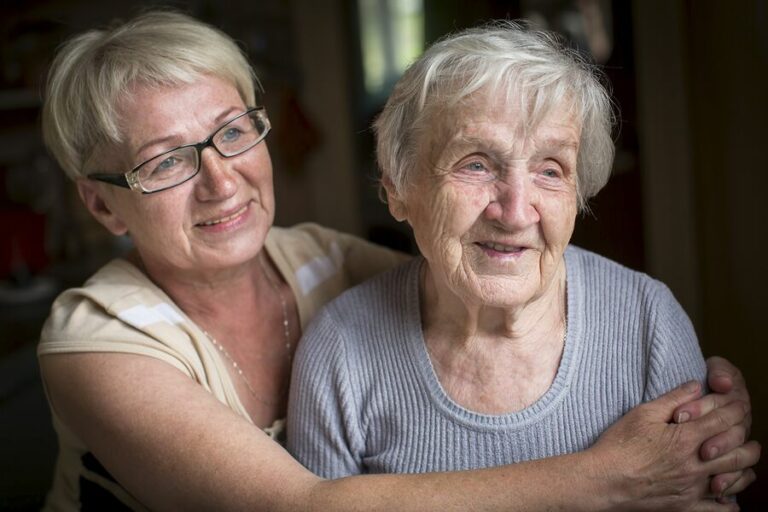The moderate, or middle, stage of Alzheimer’s disease tends to be the longest, but the advanced stage can be the most difficult. This is the stage when the challenges that your parent experiences become extreme and they will require around the clock care to manage even the most basic of daily tasks. Preparing yourself in advance for the challenges of this stage is critical to not only giving your parent the care that they need, but also to protecting your own health and well-being during this very difficult stage.

Some things that you can expect during the late stage of Alzheimer’s disease:
- Inability to respond to or interact with the world around them
- Inability to handle any of their own daily tasks, including bathing, dressing, or even eating
- Increased difficulty with eating, with the higher risk of experiencing choking
- Memory loss that extends to both past experiences and more recent experiences, with more recent experiences being more difficult to retain
- Difficulty walking and sitting up
- Difficulty swallowing
- Increased difficulty communicating, with eventual loss of communication
- Increased vulnerability to infection and illness, particularly pneumonia
- Increased risk of falling
It is important to note that each person has their own personal experience with Alzheimer’s disease and will progress in their own way. This means that you cannot truly predict how your parent will progress or what symptoms they will experience. Your parent might progress very suddenly or they could take months to go through this stage. Do not hesitate to talk to your parent’s doctor to get recommendations for how to best support your parent and protect their physical health and well-being as they move toward their end-of-life transition. This will include creating a care network featuring an elder care provider, friends, family, and others who will ensure that your parent always has access to the care that they need.
How can elder care help?
Starting elder care can be a fantastic way to encourage higher quality of life for your aging parent as they age in place. An elderly home care services provider can be with your aging parent on a customized schedule to ensure that they have access to all of the care, support, and assistance that they need to manage their needs in a way that respects their individual thoughts, opinions, beliefs, and goals. Through these highly personalized services, the elder care provider can help your parent to stay healthy, happy, safe, and comfortable while also encouraging more independence and fulfillment throughout their later years. These services can include safe and reliable transportation, medication reminders, assistance with running errands, help with personal care needs, meal preparation, and more.
If you or an aging loved one is considering Elder Care in Mount Vernon, VA, please contact the caring staff at Access Home Care Inc. Proudly Serving Northern Virginia and Surroundings for over 12 years. Call Us: (703) 765-9350
Source:
https://www.alz.org/alzheimers_disease_stages_of_alzheimers.asp
“My desire to enter into nursing started when one of my older sisters died of kidney disease due to lack of care. At age 15, I decided to enter into nursing so that I could provide quality care to patients.Upon arrival in United States at 21 years of age, I enrolled in T.C Willliams School of Practical Nursing while working as a nursing assistant at a nursing home. I also worked as a part-time home health aide to take of the elderly. After completion of my practical nurse education, I worked in geriatric psychiatry unit at Dominion Hospital and Arlington Correctional facility mental health unit.
I completed Marymount University in 2001 and entered into Home Care as a field case manager.
I held that position for 2 years and as an Administrator, and for another 2 years until Access Home Care was found in 2004."
Today, Access Home Care has over 300 employees and 286 clients.
- Personal Care at Home Helps Seniors Stuck at Home Connect With Others - April 17, 2025
- Five Tips for Living with Chronic Lower Back Pain - April 3, 2025
- How 24-Hour Home Care Is Different From Other Types Of Care - March 19, 2025



